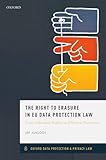The right to erasure in EU data protection law : from individual rights to effective protection / Jef Ausloos.
Material type: TextSeries: Oxford data protection and privacy lawPublisher: Oxford ; New York : Oxford University Press, 2020Edition: First editionDescription: xxix, 529 pages ; 24 cmContent type:
TextSeries: Oxford data protection and privacy lawPublisher: Oxford ; New York : Oxford University Press, 2020Edition: First editionDescription: xxix, 529 pages ; 24 cmContent type: - text
- unmediated
- volume
- 9780198847977
- 0198847971
- 343.240999 AUS 23rd
- KJE6071 .A98 2020
| Item type | Current library | Collection | Call number | Copy number | Status | Notes | Date due | Barcode | |
|---|---|---|---|---|---|---|---|---|---|
| Reference Book | VIT AP School of Law LAW Section | Reference | 343.240999 AUS (Browse shelf(Opens below)) | LA02703 | In transit from VIT-AP to VIT AP School of Law since 2024-08-13 Not For Loan | LAW | 021924 | ||
| Text Book | VIT AP School of Law LAW Section | 343.240999 AUS (Browse shelf(Opens below)) | LA02704 | Available | LAW | 021925 |
Includes bibliographical references (pages 479-526) and index.
Introduction -- Foundations of data protection law -- Scope of the right to erasure -- Conditions of the right to erasure -- Balancing in the GDPR -- Balancing scenarios -- Open questions on balancing in the GDPR -- The right to erasure in practice -- Summary and conclusion.
This book critically investigates the role of data subject rights in countering information and power asymmetries online. It aims at dissecting 'data subject empowerment' in the information society through the lens of the right to erasure ("right to be forgotten") in Article 17 of the General Data Protection Regulation (GDPR). In doing so, it provides an extensive analysis of the interaction between the GDPR and the fundamental right to data protection in Art.8 of the Charter of Fundamental Rights of the EU (Charter), how data subject rights affect fair balancing of fundamental rights, and what the practical challenges are to effective data subject rights. The book starts with exploring the data-driven asymmetries that characterise individuals' relationship with tech giants. These commercial entities increasingly anticipate and govern how people interact with each other and the world around them, affecting core values such as individual autonomy, dignity and freedom. The book explores how data protection law, and data subject rights in particular, enable resisting, breaking down or at the very least critically engaging with these asymmetric relationships. It concludes that despite substantial legal and practical hurdles, the GDPR's right to erasure does play a meaningful role in furthering the fundamental right to data protection (Art. 8 Charter) in the face of power asymmetries online.
There are no comments on this title.

